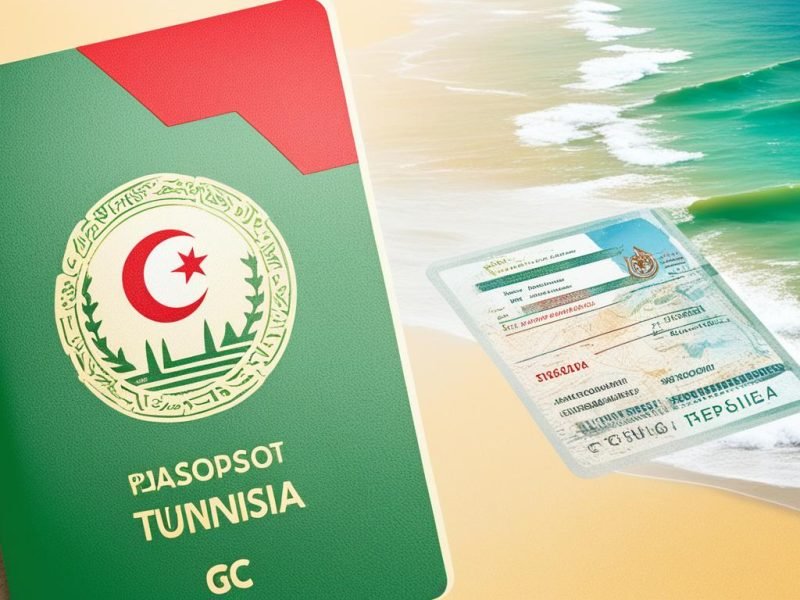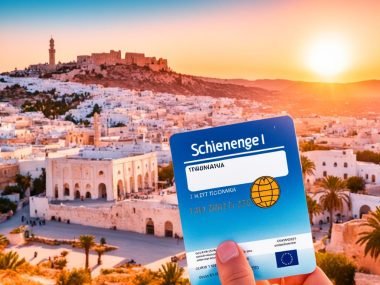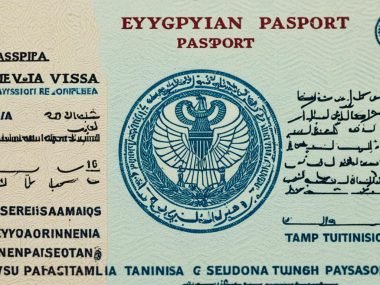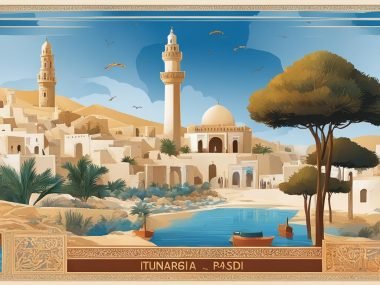Traveling internationally often raises questions. One common one among Gulf Cooperation Council (GCC) members is about needing a visa for Tunisia. This question highlights the travel dynamics for GCC citizens to Tunisia. It also points out the simplicity and complexity of this journey.
My aim is to clarify travel rules for GCC residents wanting to visit Tunisia. Those with a GCC Residence Permit have a special exception. This policy makes traveling to Tunisia easier and more appealing. It turns a potentially difficult process into an easy entry to North Africa.
Key Takeaways
- Tunisia offers a visa on arrival to GCC residents with valid permits. This makes planning a trip there easier.
- For stays up to 15 days, GCC residents don’t need to apply for a visa in advance. This is a special exception.
- You need a GCC Residence permit valid for at least 6 months, among other requirements. This is important for a smooth travel to Tunisia.
- Knowing the specifics of Tunisia’s visa policy is key. It helps GCC citizens enter smoothly and avoids travel problems.
- This visa ease shows the strong ties between Tunisia and GCC countries. It encourages visits and cultural exchanges.
Understanding Tunisia’s Visa Policy for GCC Residents
Planning a trip to Tunisia is exciting for GCC residents. Yet, knowing the visa rules is key. It makes travel smoother, avoiding surprises.
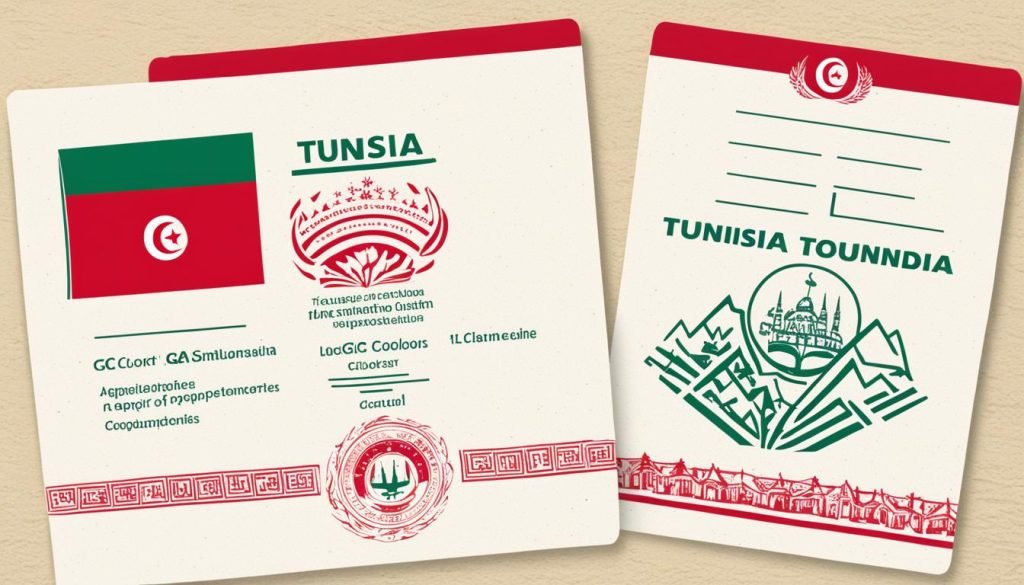
Tunisia’s Visa Waiver Program: Benefits for GCC Residents
GCC residents enjoy a special perk: Tunisia’s Visa Waiver Program. If you live in a GCC country and have a valid permit, you don’t need a visa. This makes planning your visit much easier.
Visa on Arrival for GCC Permit Holders: Entry Conditions
Getting a visa on arrival has its own rules. You need a passport and permit, both valid for six months after entering Tunisia. Besides, you must show you have enough money and a place to stay.
| Requirement | Description |
|---|---|
| Valid Residence Permit | A residence permit issued by a GCC country, valid for a minimum of six months beyond entry into Tunisia. |
| Passport Validity | Passport must maintain validity for six months post the proposed entry date. |
| Economic Solvency | Evidence of sufficient financial means to cover the duration of stay. |
| Secured Accommodation | A hotel reservation or other proof of accommodation arrangements within Tunisia. |
Tunisia welcomes GCC residents, making it easy to explore its history and culture. The visa process is visitor-friendly, showing Tunisia’s warm hospitality.
Tunisia E-Visa: Simplifying Travel for GCC Nationals
I have been looking into the Tunisia visa exemption for GCC residents. I found out the upcoming E-Visa system will change how GCC nationals apply to enter Tunisia. Before, GCC residents had to go to an embassy to apply for a visa to Tunisia. But now, the E-Visa will make everything digital, easy, and quick.
The Convenience of Applying for a Tunisia E-Visa
Imagine planning your trip to Tunisia from your home. That’s what the Tunisia e-visa offers to GCC nationals. The new E-Visa website is made to be easy to use. It will make applying for a visa straightforward with just a few clicks online. Everyone is excited for this new online system to start.
Key Information About the Tunisia E-Visa Process
Getting ready for the E-Visa system means knowing what to expect. Here’s a simple guide on how it’s going to work. It shows how easy and quick it will be for GCC residents applying for a Tunisia visa:
| Step in E-Visa Process | Description |
|---|---|
| 1. Online Form Completion | Applicants will fill a digital form, providing necessary personal and trip details. |
| 2. Document Submission | Scanned copies of required documents, including passports and photos, must be uploaded. |
| 3. Application Fee Payment | Payment of the non-refundable application fee through secure online channels. |
| 4. E-Visa Approval | Post submission, approvals may take up to three days, after which the E-Visa is emailed. |
The new Tunisia e-visa for GCC nationals marks a new chapter. It makes the visa exemption for GCC residents even better. As we wait for this new feature, I believe it will make Tunisia even more popular among GCC travelers.
Does GCC Residents Need Visa For Tunisia?
For GCC citizens planning to visit Tunisia, getting a visa is a common concern. Most travelers must have a visa. But, GCC residents enjoy a simpler visa policy. If you have a residence permit from a GCC country, you might get a visa on arrival. This makes going to Tunisia easier.
It’s key for GCC nationals to know about Tunisia’s visa rules before a trip. Tunisia lets eligible GCC citizens get a 15-day visa on arrival. This approach shows Tunisia’s effort to build strong relations with GCC countries. It makes getting a visa easier and improves the trip for GCC visitors.
- Preferential visa policy for GCC residents
- 15-day visa on arrival available for eligible GCC nationals
- Conducive to both leisure and business travels
Tunisia has a lot to offer GCC travelers like sunny beaches and historical sites. The country’s mix of Mediterranean and North African cultures is unique. Tunisia welcomes GCC tourists for both fun and work. Its friendly policy fits your travel needs.
Traveling to Tunisia from GCC with a visa has never been more accessible for GCC nationals. Feel the warmth of the Mediterranean sun and breathe in the rich cultural heritage with ease, thanks to Tunisia’s open door policy.
| Visa Requirement | Details for GCC Nationals |
|---|---|
| Standard Entry Visa | Generally required for all travelers |
| Visa on Arrival | Available for GCC residents with valid permits |
| Duration | Up to 15 days |
| Benefits | Facilitates leisure and business travels |
Tunisia’s visa policies aim to boost tourism and show goodwill to GCC countries. If you’re dreaming of Tunisia’s sunny beaches or its rich history, traveling there is easier for GCC nationals. Tunisia is ready to welcome you.
Visa-Free Access to Tunisia for GCC Nationals
For GCC residents in Tunisia, knowing visa rules is crucial for smooth travel. I’ve researched Tunisia’s visa policies thoroughly. Luckily, GCC nationals enjoy certain benefits, such as exemptions for specific passports or those in organized groups. These perks make planning a trip to Tunisia easier and more flexible.
The Role of Diplomatic and Service Passports in Visa Exemptions
Diplomatic and service passport holders from the GCC get a special pass. This exemption builds good relationships between nations and makes travel simpler for officials. It aids in promoting diplomatic efforts and makes attending global events less of a hassle.
Special Arrangements for Organized Tour Groups
Tunisia also has a special offer for GCC tour groups. This is part of Tunisia’s plan to attract more visitors. To enjoy this benefit, groups must meet specific requirements. This ensures a smooth arrival while keeping Tunisia safe and welcoming.
Visa-free access is a major step towards enhancing cultural and economic ties. It turns every trip to Tunisia for GCC residents into an opportunity to make unforgettable memories.
Conclusion
If you’re from the GCC region and curious about visiting Tunisia, you’ve got good news. Tunisia has made its rules friendly for travelers from the Gulf. This means that if you have a GCC Residence permit, you can enter Tunisia easily. You won’t need the usual visa to experience its rich culture and beautiful scenery.
Tunisia is introducing a visa waiver program and also plans for an E-Visa system. These changes show Tunisia wants to welcome people from GCC countries easily. It’s all about making travel simpler and the journey more enjoyable for you.
For those of us living in the GCC, Tunisia offers so much to explore. We can visit ancient sites or relax on beautiful beaches, all easily thanks to Tunisia’s welcoming visa policy. This visa policy shows the warm relationship between Tunisia and GCC countries. It promises an experience full of cultural richness and warm welcomes.

